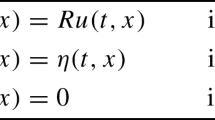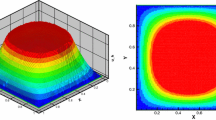Abstract
This paper is devoted to an optimal control problem of Maxwell’s equations in the presence of pointwise state constraints. The control is given by a divergence-free three-dimensional vector function representing an applied current density. To cope with the divergence-free constraint on the control, we consider a vector potential ansatz. Due to the lack of regularity of the control-to-state mapping, existence of Lagrange multipliers cannot be guaranteed. We regularize the optimal control problem by penalizing the pointwise state constraints. Optimality conditions for the regularized problem can be derived straightforwardly. It also turns out that the solution of the regularized problem enjoys higher regularity which then allows us to establish its convergence towards the solution of the unregularized problem. The second part of the paper focuses on the numerical analysis of the regularized optimal control problem. Here the state and the control are discretized by Nédélec’s curl-conforming edge elements. Employing the higher regularity property of the optimal control, we establish an a priori error estimate for the discretization error in the \(\boldsymbol{H}(\bold{curl})\)-norm. The paper ends by numerical results including a numerical verification of our theoretical results.
Similar content being viewed by others
References
Alonso, A., Valli, A.: An optimal domain decomposition preconditioner for low-frequency time-harmonic Maxwell equations. Math. Comput. 68(226), 607–631 (1999)
Alonso, A., Valli, A.: Eddy Current Approximation of Maxwell Equations: Theory, Algorithms and Applications. Springer, Berlin (2010)
Amrouche, C., Bernardi, C., Dauge, M., Girault, V.: Vector potentials in three-dimensional non-smooth domains. Math. Methods Appl. Sci. 21, 823–864 (1998)
Beck, R., Hiptmair, R., Hoppe, R.H.W., Wohlmuth, B.: Residual based a posteriori error estimators for eddy current computation. M2AN Math. Model. Numer. Anal. 34(1), 159–182 (2000)
Bossavit, A.: Computational Electromagnetism. Academic Press, San Diego (1998)
Casas, E.: Control of an elliptic problem with pointwise state constraints. SIAM J. Control Optim. 4, 1309–1322 (1986)
Ciarlet, P. Jr. , Zou, J.: Fully discrete finite element approaches for time-dependent Maxwell’s equations. Numer. Math. 82(2), 193–219 (1999)
Costabel, M., Dauge, M.: Singularities of electromagnetic fields in polyhedral domains. Arch. Ration. Mech. Anal. 151(3), 221–276 (2000)
Costabel, M., Dauge, M., Nicaise, S.: Singularities of Maxwell interface problems. M2AN Math. Model. Numer. Anal. 33(3), 627–649 (1999)
Girault, V., Raviart, P.: Finite Element Methods for Navier–Stokes Equations. Springer, Berlin (1986)
Hiptmair, R.: Multigrid method for Maxwell’s equations. SIAM J. Numer. Anal. 36(1), 204–225 (1998)
Hiptmair, R.: Finite elements in computational electromagnetism. Acta Numer. 11(1), 237–339 (2002)
Hoppe, R.H.W.: Adaptive multigrid and domain decomposition methods in the computation of electromagnetic fields. J. Comput. Appl. Math. 168(1–2), 245–254 (2004)
Hoppe, R.H.W., Schöberl, J.: Convergence of adaptive edge element methods for the 3D eddy currents equations. J. Comput. Math. 27, 657–676 (2009)
Ito, K., Kunisch, K.: Semi-smooth Newton methods for state-constrained optimal control problems. Syst. Control Lett. 50, 221–228 (2003)
Ito, K., Kunisch, K.: Lagrange Multiplier Approach to Variational Problems and Applications. Society for Industrial and Applied Mathematics, Philadelphia (2008)
Landau, L.D., Lifshitz, E.M.: Electrodynamics of continuous media. In: Course of Theoretical Physics, vol. 8. Pergamon, Oxford (1960). Translated from the Russian by J.B. Sykes and J.S. Bell
Monk, P.: Analysis of a finite element method for Maxwell’s equations. SIAM J. Numer. Anal. 29, 714–729 (1992)
Monk, P.: Finite Element Methods for Maxwell’s Equations. Clarendon, Oxford (2003)
Nédélec, J.C.: Mixed finite elements in ℝ3. Numer. Math. 35, 315–341 (1980)
Nédélec, J.C.: A new family of mixed finite elements in ℝ3. Numer. Math. 50, 57–81 (1986)
Schöberl, J.: NETGEN/NGSolve, http://sourceforge.net/projects/ngsolve/
Schöberl, J.: A posteriori error estimates for Maxwell equations. Math. Comput. 77, 633–649 (2008)
Author information
Authors and Affiliations
Corresponding author
Rights and permissions
About this article
Cite this article
Yousept, I. Optimal control of Maxwell’s equations with regularized state constraints. Comput Optim Appl 52, 559–581 (2012). https://doi.org/10.1007/s10589-011-9422-2
Received:
Published:
Issue Date:
DOI: https://doi.org/10.1007/s10589-011-9422-2




